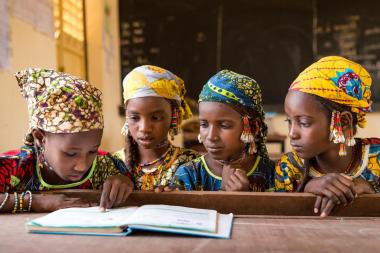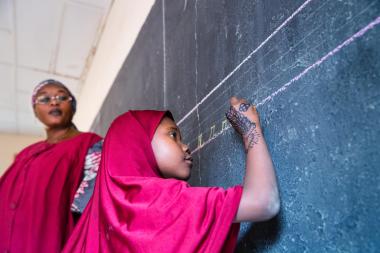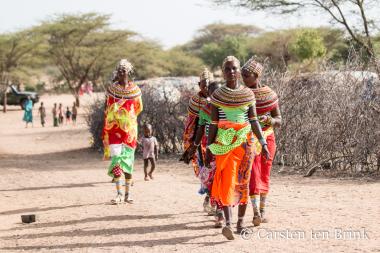Blog
Bridging the generational digital skills and knowledge gap in South Sudan
SPARC work is exploring the sensitivities of building climate resilience and digital skills among women in South Sudan.
International Women’s Day 2023 stresses the need for all women and girls to benefit from the opportunities offered by emerging technological innovations.
This theme is at the heart of SPARC, which aims to mainstream gender across all aspects of its work, and ensure its policy and programme recommendations address the root sources of inequality in all its forms.
Technological empowerment for women is one of the themes of a new project between SPARC and the Kenyatta University research team, together with the Catholic University of South Sudan and Agricultural Market Development Trust. Together, the team is undertaking a research project on building gender-responsive, climate-resilient communities in South Sudan. The research – which is still in its preliminary stages – is working with the Dinka communities, who are both fisherfolk and pastoralists in Jonglei State, and is examining how adaptation strategies can be sensitive to, and respond to, existing gender inequalities.
Digital innovations can be a critical part of helping pastoralists build resilience to climate shocks: providing them with information on pasture quality and water sources, weather forecasts, and a platform for exchanging information on safety and security. This kind of innovation is much needed in Jonglei State. The region which has been hit by extreme weather conditions, resulting in extreme heat, prolonged droughts, floods and secondary impacts such as pest infestations. Vulnerability to these exposures has been exacerbated by conflicts and governance issues leading to displacements and migrations.
Because they lack access to livelihood resources, women, girls, the elderly and people with disabilities are disproportionately affected. Supporting adaptation strategies needs to take gender differences into account in order not to reinforce this inequality.
Utilising Indigenous Knowledge
One of the key outcomes of this research is to identify and support Indigenous Knowledge that women can leverage to improve their livelihoods. For example: how do women preserve food, or even prepare foods that enable them to be adaptive to climate-related shocks? Are there ways this Indigenous Knowledge can be monetised via digital innovations? How can the fisherfolk and pastoralist women in Jonglei access, control and benefit from these? These and many more questions will guide the study.
Both men and women are well aware of the important role that women play in sharing Indigenous Knowledge, and the limitations they face. As researchers, we learnt the importance of creating safe spaces where both men and women speak to, and interpret, their reality using their cultural knowledge.
It is also important to co-design and employ participatory approaches in unpacking terms such as empowerment. Available indicators for women empowerment only make sense when contextual realities are taken into consideration. For example, a senior chief (all the chiefs were male) was critical of a question about women’s ownership of cows. He cautioned the research team “not to just ask whether women own cows”, which does not accurately reflect the system of cattle ownership, but recast the question to “explore the conditions under which women may own cows among the Dinka, and what this would mean to them”. Similarly, the elders underlined the need to “trace the value attached to women and girls at different phases in life.” These examples indicate the importance of co-creation and participatory approaches in data collection where stakeholders are given an opportunity to bring in their expertise in a safe space.
Literacy and digital empowerment
Literacy is an important yet often overlooked factor when discussing the role of digital innovation in gender empowerment. In our recent community workshop in in Bor town, for example, we noted that unlike men, women were not willing to take the book and pen given out to the participants, possibly because they do not know how to read and write, and were also hesitant to contribute to the discussion during the plenary - although they shared very pertinent information during the women-only focus group discussion.
Women’s inability to read and write often leads to self-marginalisation, especially in mixed gender groups where existing social norms inform communication practices. The research challenge, therefore, is to ensure that the voices of women, who are often at the margins of society, are heard and amplified.
There is also a generational aspect to this. Many younger women have received a formal education, whereas the older generation, while possessing great experience, have not necessarily had the same opportunity due to the many years of conflict in South Sudan. These women who lack formal education tend to downplay their skills and knowledge, often to the detriment of whole communities. In order to afford women and girls more benefits and in heeding to the call for digitising all sectors, technology must be used and taught on an equal footing among men, women, boys and girls.
Understanding smartphone use
Supporting digital empowerment starts with understanding how people in a community are already interacting with technology, and how to support them to increase their skills. A survey by Oxfam, for example, has shown that although most women own phones in informal settlements in Nairobi, Kenya, they only use them for texting and calling and not for enhancing their business. However, once taught, these women learnt how to market their wares on social media, and were able to advertise an item and sell it via social media including Facebook.
In our community workshop, the team of facilitators from Kenyatta University noted that participants were very attentive and keenly observed the use of technology and photographs used in the presentation. This showed that they relate with the information depicted in the photographs, hence enhancing communication despite language barriers.
Similarly, while the female youth representative in the community workshop had a smartphone, the other two women representatives were the only ones (out of a total of 25 participants) who did not own phones. We noted that the men, from time to time left the meeting room to receive telephone calls, while the women did not. Yet these two women were very knowledgeable as to what was happening on the ground. How can these women be empowered?
Although still in its foundational stage, the research already done by Kenyatta University and partners shows that there are several things needed to bridge the generational and gender knowledge gap amongst pastoralists and fisherfolk in Jonglei in South Sudan, and to help every woman acquire digital skills. Participatory approaches, networking opportunities which bring together the young and old, and an understanding of how literacy shapes people’s understanding of their own ability, are key to progress.
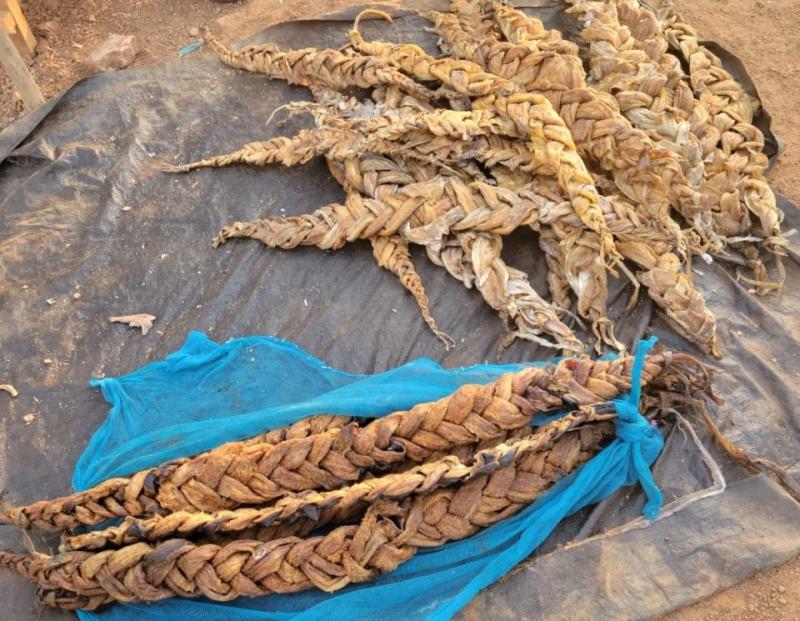
Women use indigenous methods of preserving fish fish in Bor town. Digital technology could help women advertise products like this via mobile platforms for delivery by bus or boat. Credit: Kenyatta University / SPARC.
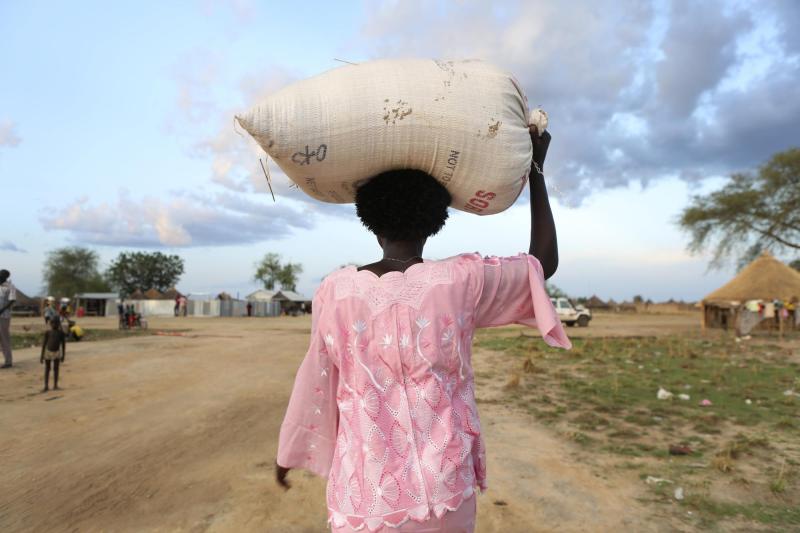
Mary Ngok, 31, a farmer in Bor County, South Sudan carries a sack of provisions on her head
Credit Image by Sara A. Fajardo/Catholic Relief Services/USAID - CC BY-NC 2.0
